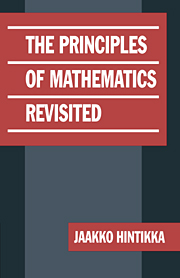Book contents
- Frontmatter
- Contents
- Introduction
- 1 The functions of logic and the problem of truth definition
- 2 The game of logic
- 3 Frege's fallacy foiled: Independence-friendly logic
- 4 The joys of independence: Some uses of IF logic
- 5 The complexities of completeness
- 6 Who's afraid of Alfred Tarski? Truth definitions for IF first-order languages
- 7 The liar belied: Negation in IF logic
- 8 Axiomatic set theory: Fraenkelstein's monster?
- 9 IF logic as a framework for mathematical theorizing
- 10 Constructivism reconstructed
- 11 The epistemology of mathematical objects
- Appendix (by Gabriel Sandu)
- References
- Index of names
- Index of subjects and titles
2 - The game of logic
Published online by Cambridge University Press: 15 December 2009
- Frontmatter
- Contents
- Introduction
- 1 The functions of logic and the problem of truth definition
- 2 The game of logic
- 3 Frege's fallacy foiled: Independence-friendly logic
- 4 The joys of independence: Some uses of IF logic
- 5 The complexities of completeness
- 6 Who's afraid of Alfred Tarski? Truth definitions for IF first-order languages
- 7 The liar belied: Negation in IF logic
- 8 Axiomatic set theory: Fraenkelstein's monster?
- 9 IF logic as a framework for mathematical theorizing
- 10 Constructivism reconstructed
- 11 The epistemology of mathematical objects
- Appendix (by Gabriel Sandu)
- References
- Index of names
- Index of subjects and titles
Summary
The pivotal role of truth definitions in the foundations of logic and mathematics prompts the question whether they can be freed from the severe limitations which Tarski's impossibility result apparently imposes on them – and whether they can be freed from other alleged or real defects that critics claim to have found in them.
One defect for which Tarski-type truth definitions are blamed is that of excessive abstractness. It has been alleged by, among others, soi-disant intuitionists and contructivists, that such definitions merely characterize a certain abstract relationship between sentences and facts. But such definitions leave unexplained, so this line of thought goes, as to what it is that makes this relation a truth relation. In particular, such abstract relations are unrelated to the activities by means of which we actually verify and falsify sentences of this or that language, whether a natural language or a formal (but interpreted) one. As Wittgenstein might have put it, each expression belongs to some language game which gives that expression its meaning. A specification of truth-conditions does not provide us with such a game, as Michael Dummett has doggedly argued time and again (see, e.g., Dummett 1978, 1991).
Criticisms like these have a good deal to say for themselves. There is much to be said for the fundamental Wittgensteinian idea that all meaning is mediated by certain complexes of rule-governed human activities which Wittgenstein called language games.
- Type
- Chapter
- Information
- The Principles of Mathematics Revisited , pp. 22 - 45Publisher: Cambridge University PressPrint publication year: 1996



